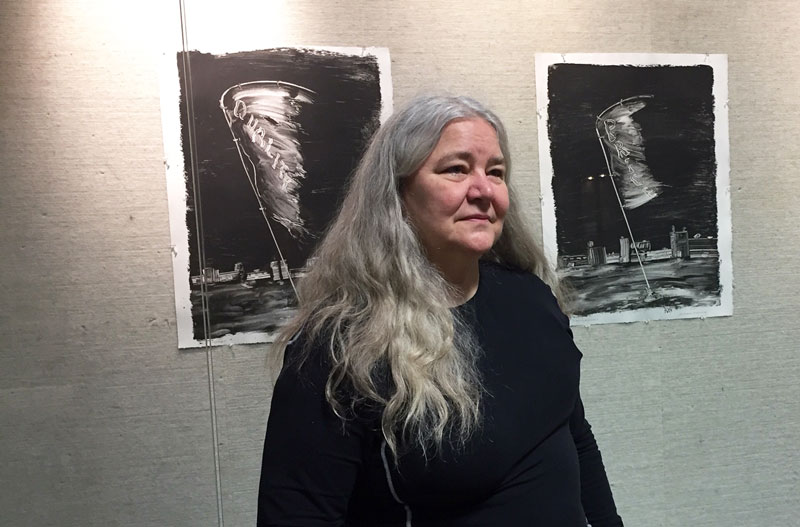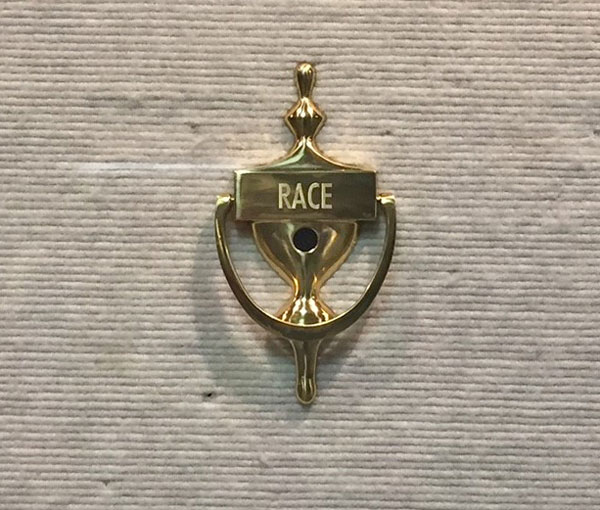
Ruthann Godollei - 2019 Fulbright Canada Research Chair in Printmaking
As a child,Ruthann Godollei used drawing as a means to create a playground of imagination, employing her artistic skills to design submarines and other structures that served as entertainment for a precocious mind.
It was printmaking, however, that Godollei eventually gravitated toward, intrigued by the way it combined her interest in old machinery like printing presses and even motorcycles, and the "grand tradition of social commentary", which to this day continues to inform much of her work.
Joining the Faculty of Arts' Department of Art & Design in January as the2019 Fulbright Canada Research Chair in Printmaking (while on sabbatical as the Dewitt Wallace Professor of Art at Macalester College in St Paul, MN), the self-described "muckraker" believes that international residencies like the Fulbright serve a purpose beyond simple academic and creative exchange.
"America is at its most xenophobic - in its treatment of immigrants, in its closing of doors to people from other countries, in its rejection of refugees," says Godollei. "But artists have the ability to put a hand across the border and say, 'let's talk'. One of the uses of political art is to give comfort to people who are temporarily losing - to let them know they are not alone. But also, to state for the record that you are against some of this nonsense."
Godollei spent the early part of her career exhibiting in alternative galleries or creating her own venues for her politically charged prints and installations. Recently however, she is the beneficiary of a growing appetite for critical commentary in art - a reflection of the politicized climate in the US, and around the world.
"People have been welcoming me into shows and galleries, because not only do I have plenty to say - there is a growing audience for it! And the Fulbright might be proof of that too; that there is acceptance for critical commentary just as there is in sociological disciplines. The muckraker moniker is a little tongue in cheek, but actually I feel like I'm a kind of landscape artist and I'm just depicting what I see."
Initially drawn to the Faculty of Arts' printmaking program for its "premiere" reputation, Godollei is particularly impressed with the two floors of printing presses and other equipment that make high quality work possible, as well as the technical and teaching staff whose diverse styles provide a rich learning environment for the students. One of those professors, Sean Caulfield, has been exchanging prints with Godollei for decades.
"Ruthann could have gone to other centres - so it speaks to the strength of the program," says Caulfield. "And it also speaks to the work of many people over many years, like Liz Ingram, Walter Jule, andLyndal Osborne - people who have established these international connections. My colleague Marilène Oliver and I are just trying to continue that, so yeah we're thrilled that's she's here because it's a sign that it's continuing. And Ruthann has been really generous with her time. We wish she could stay longer!"
As part of her four-month residency, Godollei has immersed herself in a schedule of workshops, undergraduate and graduate critiques, and community events including several projects with SNAP (the Society of Northern Alberta Print-Artists). In the Department of Art & Design, she shares a studio space with graduate students in printmaking.
"They are wonderful young artists, and it's been inspiring to be around them," says Godollei. "They even took me to the Flying Canoë Festival at 17 below!"
The record-breaking cold snap in February was no barrier for Godollei. "You just hunker down and get to work!" she laughs. "I'm from Minnesota so I had the coat, the boots, and the big fuzzy hat. When we get cold weather, they call it an Alberta Clipper."
Her current exhibition on the second floor of the Fine Arts Building features a wall of door knockers, engraved with words like "Race", "Class", and "Gender". She says the installation explores power dynamics and ideas of access. Two words are repeated: "Education" and "Dumb Luck".

"Sometimes you just need to be at the right place, at the right time," says Godollei. "There's been more than one instance in my life where I just lucked out. Other times, it's been my hard work - that I had a pen in my hand when a good idea came. But education got me out of poverty. It got me a wonderful job as a professor of art. Education got me a Fulbright! I can't stress education enough, but I also can't say it's all me. I don't control everything. I know I have white privilege, and advantages others don't have access to. That motivates me to do this work."
Godollei describes herself as a "glass half empty gal", but she is quick to add that while she may not be an optimist by nature, she is also not a quitter.
"Sometimes when I think about how bad things are socially and politically I remember that history is long, and that art talks across time. It's the one place I'm hopeful about social progress."